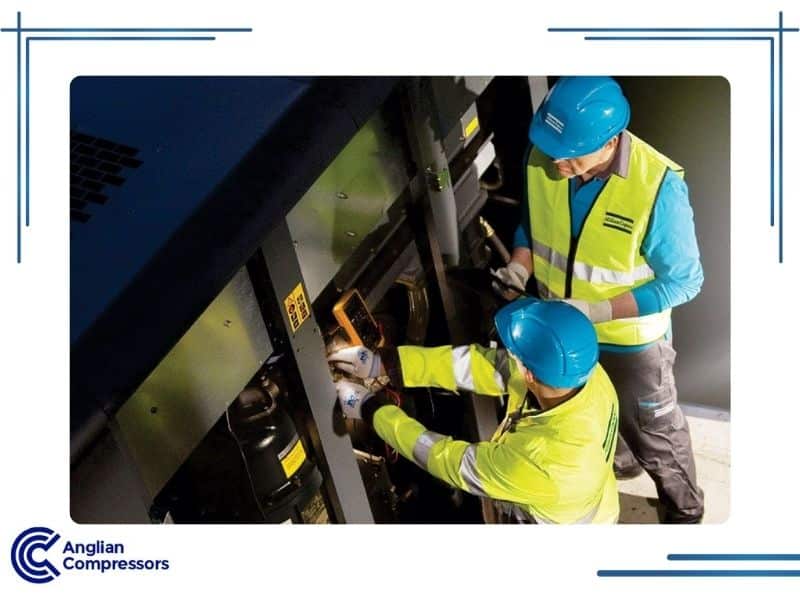UK Compressed Air Regulations
Compressed air plays a vital role in industry and manufacturing. A compressor generates compressed air that powers workplace facilities, factory systems, and pneumatic equipment.
The improper use of compressed air poses a serious risk to human health. Various compressed air regulations exist in the UK to protect against these potential dangers, most of which are mandatory.
For example, the new EN ISO 11011 legislation has established standards for assessing air systems to ensure robust policies are followed. The Pressure Systems Safety Regulations 2000 (PSSR) is a UK standard for the in-service use of air pressure machinery. Other industry standards ensure that relevant health and safety practices are adhered to.
In this blog post, we review important UK and EU regulations for compressed air, health and safety guidelines, compliance and legal aspects, and recommended resources.
1. Key Regulations Affecting Compressed Air Systems
Work on compressed air regulations continues at a steady pace. This is because it is now clearly understood, compared to in past decades, how critical work and safety are.
Below, we cover some of the key regulations relevant when working with compressed air:
Pressure Systems Safety Regulations 2000 (PSSR)
The Pressure Systems Safety Regulations (2000) requirements focus on preventing incidents that cause serious injury related to compressed air production and usage. This includes air system failures and parts failures, amongst others. The official duty holders are responsible for the safety of the equipment and its proper use.
A Written Scheme of Examination (WSE) is required before the first use of an air system. It certifies that a thorough examination of the air system has been conducted. The competent person completes the examination in accordance with the PSSR 2000 regulations and also produces the WSE.
Any subsequent changes to the air system also require an update to the WSE. These must reflect any changes and how they may affect either safety or the continued adherence to UK regulatory requirements.
Control of Substances Hazardous To Health (COSHH)
The 2002 Control of Substances Hazardous to Health Regulations (COSHH) govern and safeguard workers and visitors from the risk of air pollution and contamination.
The goal is to control exposure to air that contains oil, gases, mists, chemicals, dust, fumes, and other undesirable substances at work. COSHH falls under the jurisdiction of the Health and Safety Executive (HSE).
Environmental Compliance
The Water Resources Act of 1991 governs the legal management of condensate, water drainage, and wastewater.
Condensate – a mixture of oil and water – must be separated into its parts for safe disposal. This may allow safe drainage when the water is properly treated. This prevents the pollution of local water systems and river waterways. The local authority usually regulates the Water Resources Act.
2. Health and Safety Executive (HSE) Guidelines
As previously mentioned, the PSSR regulation provides statutory relevance for compressed air safety. However, this still falls under the remit of the Health and Safety at Work Act 1974.
Regulations establish exposure limits at work for the ingestion of hazardous materials, including dust, gases, and other compounds. The HSE requirements also apply to the installation of compressed air equipment because of the risk of exposure to compressed air. Essentially, installation must be carried out without compromising the safety of workers or others.
The risks with improper installation include:
- Incorrectly installed air systems.
- Improper piping diameter, length, bends, or fittings.
- Poor ventilation.
- Poor heat management.
- Inferior air filtration systems.
- Incorrect management of condensate and other waste products.
It is essential to recognise that while more industry- or equipment-specific regulations exist, they often fall under the HSE or still broadly support a comprehensive safety and compliance mandate.

3. Compliance Review for Compressed Air Systems
Compliance with UK compressed air regulations must be taken seriously. Whilst the company that installed an existing compressed air system could have done so correctly, that is not always the case.
To ensure your company is using compressed air in compliance with all relevant UK regulations, it is advisable to have your air systems audited. Anglian Compressors, a branch of Atlas Copco, regularly performs thorough air audits to confirm the status of air systems and determine whether adjustments are needed to meet current or future UK compressed air regulations.
Beyond an air audit, a regular maintenance schedule helps keep air compressors and related equipment in optimal condition. Smaller parts, such as air filters, oil filters, and valves, are replaced to ensure machines do not overheat and the air quality remains unimpaired.
All compliance checks and maintenance must be documented, with records kept as a best practice. This allows the business to confirm all the internal actions taken if required.
4. Common Compliance Issues and Legal Implications
Common pitfalls and non-compliance issues include:
- The compressor room was incorrectly set up.
- Inferior air quality for workers.
- Unresolved air leaks.
- Pipework failing standards for length, angles, and more.
- The condensate was not managed properly.
A failed inspection by a local authority or another body typically results in an advisory to resolve the issues. Severe fines will be imposed if this issue is not addressed. In other circumstances, fines are applied solely because of the health and safety violations and increase if non-compliance continues unabated.
Legal action and fines can be five- to six-figure sums. These are far higher than the cost of resolving the issues to stay within UK compressed air laws.
5. Support for Compliance
Compressed air compliance is an important subject. Businesses should seek out specialists within the air industry who provide air audits and can complete improvements to meet the latest UK regulations.
Anglian Compressors, a branch of Atlas Copco, offers audits of existing air systems and upgrades that meet all relevant standards. They can also install new, standards-compliant air systems to protect businesses and their employees.
Conclusion
Compressed air regulations were established to set standards and regulate safety more systematically. This has resulted in substantial improvements in safety standards for businesses and their employees who use compressed air.
Companies must ensure the safety of their employees. Significant health risks are associated with the production and storage of compressed air. Therefore, businesses must take safety seriously. When failing to do so, the legal, financial, and human health consequences are severe.
Contact Anglian Compressors, a branch of Atlas Copco, to have your air system reviewed or to learn how we can install a compliant air compressor system tailored to your company’s needs.


